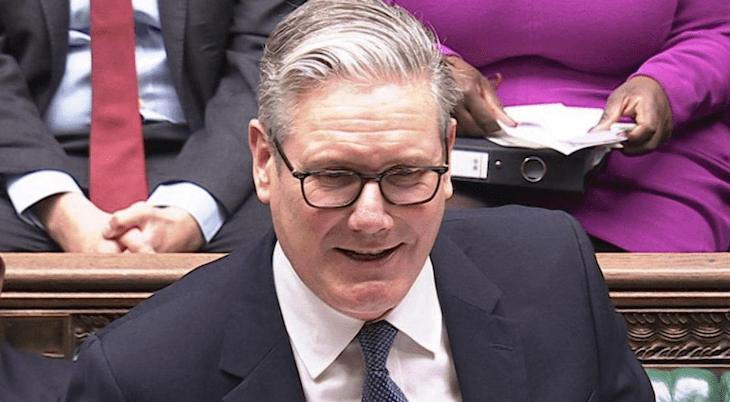I’m old enough to remember the last years of the Cold War. There were definite signs of a thaw by the time of my childhood – there were weary sighs when I wrote about the Reykjavík Summit for my prep school magazine – but the threat of genuine conflict still hovered over West and East, and we all understood that such a conflict could be existential. If nothing else, it currently provides a tinge of nostalgia to the strategic frostiness with Vladimir Putin’s Russia.
The Telegraph reports that officials have been instructed to update contingency plans for a direct attack on the United Kingdom by a foreign power. Given that General Sergei Shoigu, secretary of the Russian Federation’s Security Council, has warned that the presence of UK or allied forces in Ukraine ‘could lead to a direct clash between Nato and Russia and subsequently to world war three’, we all know what that ‘foreign power’ might be.
The Cabinet Office Resilience Directorate, which is responsible for crisis preparedness and risk reduction, will devise scenarios including strikes by conventional, hypersonic or nuclear-armed missiles, cyber attacks and the targeting of critical national infrastructure like the electricity grid, nuclear power stations, gas terminals, transport hubs and undersea cables. It will also create plans for crisis management and the maintenance of government in the wake of such attacks.
This is headily redolent Cold War stuff. Last year, I wrote that James Heappey, a former Conservative defence minister, had urged the previous government to update the War Book, the exhaustively detailed three-part manual which set out how Britain would react in the event of a conflict with the Soviet Union.
The nonpareil authority on this subject is Professor Peter Hennessy, Baron Hennessy of Nympsfield, of Queen Mary University of London, whose 2002 book The Secret State: Whitehall and the Cold War, analyses the Soviet threat as presented to ministers and the preparations contained in the War Book. These included provision for the Queen to go aboard the Royal Yacht Britannia as a floating bunker, and the war cabinet to assemble in a facility underneath Box Hill in the Cotswolds.
Some of you may be thinking that this is unnecessary and far-fetched – civil servants and soldiers working themselves into a frenzy over a deeply improbable scenario. Yes and no: as matters stand, the likelihood of a full-scale confrontation between Russia and the UK, including major Russian military action against the British Isles, is relatively low. But that is not how government bureaucracies work. However tempting it may be, when a senior Russian government official has spoken openly, even if in bloviation, of world war three, the civil service cannot simply shrug and reason that he probably doesn’t mean it.
A homeland defence plan does currently exist, but it has not been updated for at least 20 years, rendering it as good as useless. What we do know is that the armed forces are already stretched beyond endurance, with minimal provision for protecting the UK itself; that Russian naval vessels have patrolled extensively around the coast of Britain and Ireland, and are believed to have surveilled undersea cables; and that Russia has developed a range of sophisticated new ballistic missiles, some of which may be all but impossible to intercept with current technology.
We should have learned over the past decades that the international security situation can change very quickly
Whitehall recently wargamed the scenario of a hostile state undertaking missile and cyber attacks on the UK’s critical national infrastructure, and the published risk assessment was not promising. Britain’s missile defences would not be able to intercept every incoming weapon, and the attack would be ‘likely to result in civilian fatalities as well as members of the emergency services.’ For the scale and horror of those ‘civilian fatalities’, we need only look at the news from Ukraine over the last three years.
All governments, and all military establishments especially, devise scenarios and make plans accordingly. It is what they do. If there is not an immediately plausible scenario for which to plan, they will move to less plausible ones. By the time of the attack on Pearl Harbor in 1941 which brought it into conflict with the United States and Britain, the Empire of Japan had been at war with China for four years, but the Imperial General Staff had also prepared for hostilities against the Soviet Union. Such a scenario was not likely, but it was possible.
War with Russia is not an immediate threat, nor is a full-scale attack on the UK. But we should have learned over the past decades that the international security situation can change very quickly. Imagining Sir Keir Starmer and David Lammy in a bunker in Wiltshire, issuing letters patent to regional commissioners to maintain essential services, may seem far-fetched. But imagine the consequences of not preparing if the worst then happened. These preparations may look foolish, but neglecting them would bear the taint of criminal irresponsibility.









Comments